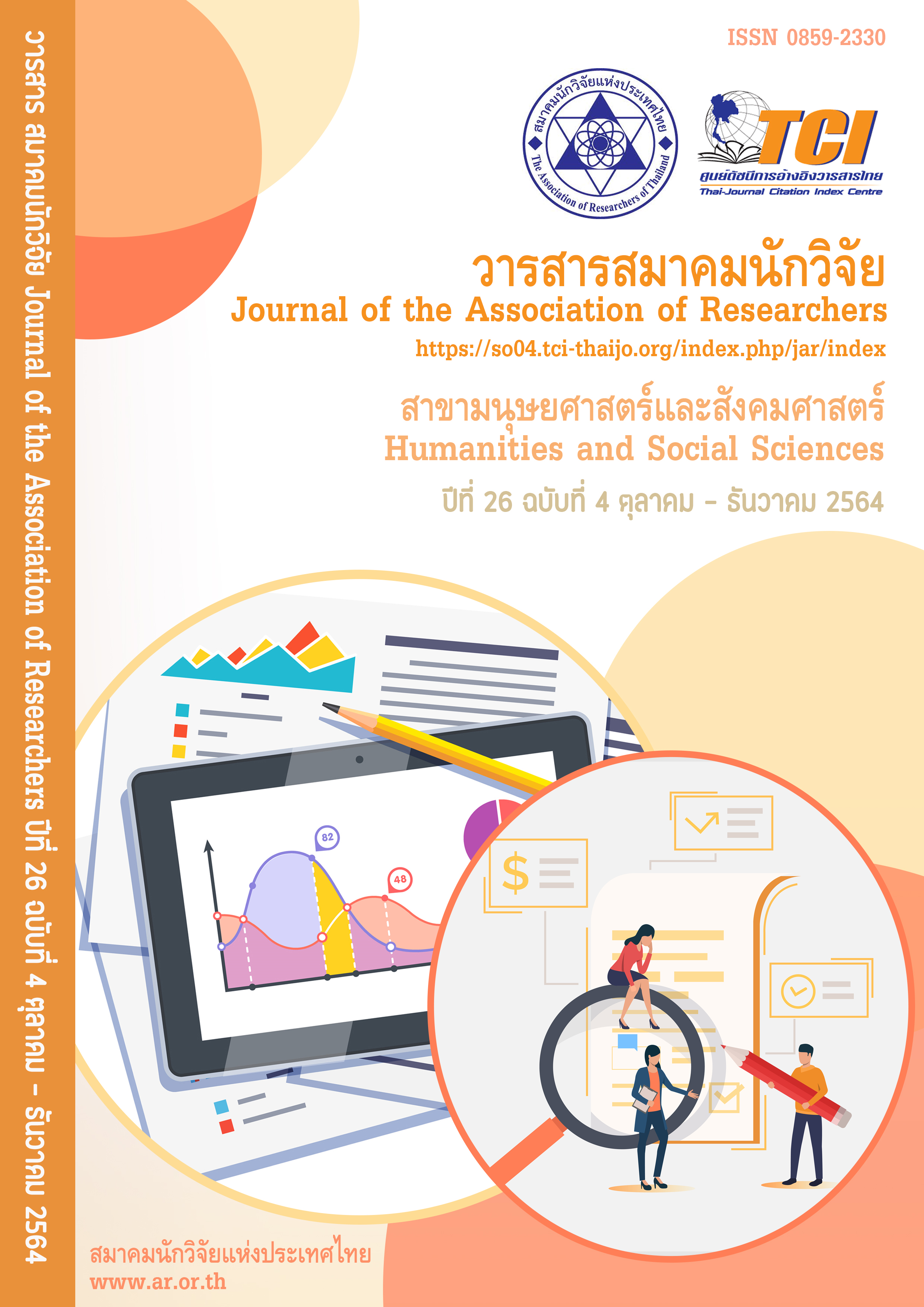Lessons Learned on the Learning Process to Develop Desirable Moral Characteristics of Police Cadets: A Case Study of Police Cadets' Host Families
Main Article Content
Abstract
This research aimed to study guidelines to develop desirable characteristics of morality and ethics of police cadets participating in the academy’s community service for people in rural areas. Both quantitative and qualitative research methods were used. In terms of quantitative research, data from 116 first-year police cadets were collected. as well as the data from key informants, namely host families, police cadets, and officials involved in the implementation of the program The research instruments were a questionnaire and interview. The data were analyzed using percentage, mean, standard deviation, priority needs index, and content analysis. The results of the study were as follows: The results of needs assessment for desirable characteristics development of the morality and ethics of the police cadets in the whole of four areas: justice, responsibility, honesty, and sacrifice, suggested that current characteristics were at a high level (µ = 3.66) and desirable characteristics were at the highest level (µ = 4.81), and the priority needs index (PNIModified) was .31. Guidelines for developing a learning process to develop desirable characteristics of morality and ethics of police cadets is the development of learning processes to promote morality and ethics of police cadets participating in the academy’s community service for people in rural areas. The development of the learning process is divided into 3 areas: roles of the Royal Police Cadet Academy, roles of the host families, and roles of police cadets.
Article Details
บทความที่ปรากฏในวารสารนี้ เป็นความรับผิดชอบของผู้เขียน ซึ่งสมาคมนักวิจัยไม่จำเป็นต้องเห็นด้วยเสมอไป การนำเสนอผลงานวิจัยและบทความในวารสารนี้ไปเผยแพร่สามารถกระทำได้ โดยระบุแหล่งอ้างอิงจาก "วารสารสมาคมนักวิจัย"
References
กรองทิพย์ นาควิเชตร (2554)ภาวะผู้นำสร้างสรรค์เพื่อการศึกษา,สมุทรปราการ : ธีรสาส์น พับลิชเชอร์
รัฐธรรมนูญแห่งราชอาณาจักรไทย พ.ศ. 2550, ราชกิจจานุเบกษา เล่ม 124/ตอนที่ 47 ก/หน้า 1/24
สิงหาคม 2550
พระราชบัญญัติตำรวจแห่งชาติ พ.ศ.2547
ภัคสกุล นาคจู (2557)ความรู้เบื้องต้นเกี่ยวกับอารมณ์ Introduction to Emotion กรุงเทพฯภัคสุภรณ์
การพิมพ์
วิกิพีเดีย (2561)
วีระ นิจไตรรัตน์ (2551) . คู่มือถอดความรู้ด้วยเทคนิคการเล่าเรื่อง. พิมพ์ครั้งที่ 1.กรุงเทพฯ:รวม
ทวีผลการพิมพ
วิจารณ์ พานิช (2548).การจัดการความรู้กับการบริหารราชการไทย. กรุงเทพฯ: สถาบันส่งเสริม. การ
จัดการความรู้เพื่อสังคม.
คู่มือนักเรียนนายร้อยตำรวจรุ่นที่ 75 , (2560) คณะตำรวจศาสตร์ โรงเรียนนายร้อยตำรวจอำเภอสาม
พราน จังหวัดนครปฐมประภาพรรณ อุ่นอบ (2552)
พระมหาวุฒิชัย วชิรเมธี (2564) จากhttps://www.area.co.th/thai/area_announce/area_
press.php?strquey=press_announcement4652.htm
รณชัย บุญลือ (2548)การพัฒนาพฤติกรรมเชิงจริยธรรมด้านความรับผิดชอบ โดยใช้กิจกรรมที่มีการ
ประเมินผลตามสภาพจริง กับกิจกรรมที่มีการประเมินผลปรกติ . รายงานการวิจัย, สำนักงาน
บริหารและพัฒนาองค์ความรู้(องค์การมหาชน),ศูนย์ส่งเสริมและพัฒนาพลัง
แผ่นดินเชิงคุณธรรม
สมบูรณ์ ชิตพงษ์ (2544)การวัดและประเมินผู้เรียนด้านคุณธรรมจริยธรรม / สำนักงานคณะกรรมการ
การศึกษาแห่งชาติ สำนักนายกรัฐมนตรี พิมพลักษณ์ กรุงเทพฯ : จุฬาลงกรณ์มหาวิทยาลัย
สุวิมล ว่องวาณิช และนงลักษณ์ วิรัชชัย (2543) ปัจจัยและกระบวนการที่เอื้อต่อการพัฒนาคุณธรรมระดับบุคคลเพื่อมุ่งความสำเร็จของส่วนรวมของนักศึกษามหาวิทยาลัย : การศึกษาเชิงปริมาณและคุณภาพ, ภาควิชาวิจัยการศึกษา จุฬาลงกรณ์มหาวิทยาลัย:กรุงเทพฯ. DOI : https://doi.nrct.go.th/ListDoi/listDetail?Resolve_DOI
สุพัตรา สุภาพ (2537) สังคมและวัฒนธรรมไทย, กรุงเทพฯ : ไทยวัฒนาพานิช
อัจฉรา ไชยูปถัมภ์ (2558)การพัฒนาตัวบ่งชี้คุณธรรมจริยธรรมและแนวทางปฏิบัติเพื่เสริมสร้างความเป็น
บัณฑิต ที่พึงประสงค์ของสถาบันอุดมศึกษาในเครือข่ายสถาบันอุดมศึกษาเขตภาคกลาง, วารสารครุศาสตร์ ปีที่ 46 (3) 268-286
Diana Baumind 1971. “Current Patterns of Parental Authority.” Developmental
Psychology Monongraphs 4: 1-103.
Munn, Fernald, (1969) Introduction to psychology . (Second edition.). Boston, etc.:
Houghton Mifflin Co


